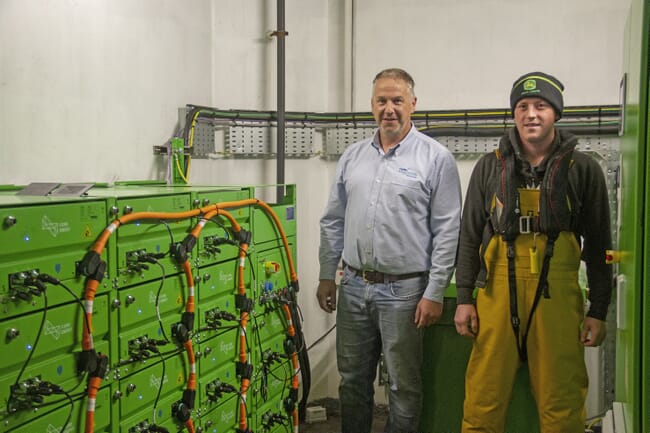
The barge was retroactively converted from diesel to hybrid power, which should reduce fuel consumption by 40 percent © Cooke Aquaculture Scotland
The move follows successful results from installing its first hybrid system at its Mill Bay site in Stronsay, Orkney in 2022.
In its first year, the hybrid solution at Mill Bay has reduced fuel consumption by 40 per cent, leading to a significant reduction in the site’s greenhouse gas (GHG) emissions and fuel usage. It further contributes to a quieter working environment for barge personnel and the neighboring area.
The hybrid system uses the residual capacity from the generator to charge the batteries, while at the same time, the auxiliary diesel generator feeds electricity to the rest of the facility. Once the batteries are fully charged, the generator stops, and the hybrid system operates the facility.
The Vestness site is the first in Orkney to have a retrofit installation on an existing barge.
Stewart Rendall, North Isles manager for Cooke Aquaculture Scotland’s Orkney sites, said in a press release: “This second hybrid system installation at our Vestness barge is a significant investment and one that makes economic and environmental sense. Introducing it to more of our ocean sites shows our commitment to sustainability. Farm-raised salmon already have the lowest carbon footprint of any animal protein but there is always more we can do to minimise any impact.
“This one barge is expected to achieve carbon savings of approximately 146 tonnes of CO2 every year, the equivalent of removing 55 cars from our roads every year.”
Working in partnership with Norwegian sustainability leaders Fjord Maritime, who developed the hybrid technology, Cooke has gained instant results by reducing fuel usage and generator running time.
Steve Burns, managing director for Fjord Maritime UK, said: “To invest and upgrade existing barges with green technology that optimise energy production, reduces fuel consumption, reduce noise pollution and reduce GHGs, is sustainability in every way. It shows that Cooke continue their sustainability commitment, improving quality, energy optimisation and environmental performance.”



